In this entry I would like to delve deeper into consciousness as it relates to myth. I will explore some esoteric ideas and hope to get at the function of story and identity in our modern culture. Language is deeply entwined in the act of story telling. It is possible to bypass it in music, image, and dance. However, in our culture, language has moved to the forefront of not only intellectual pursuits, but also art. Movies and television are usually littered with the words except in some rare examples, usually in the animated realm. Books, of course, are only language. Graphic novels use both images and text to tell a story. Talk radio, like a book, is pure words and almost a form of hypnosis. The purpose of this is to ground our identity in the mythic dimension. The clear link between this and my prior research into shamanism and hypnosis is the subconscious/Mother and the conscious/Saturn. Reading puts our conscious out of commission and places it into a hunting position as Leonard Shlain postulates, letting our sub-conscious take control of the rest of our functions. There is a balancing act here, one I hope to delve into deeply, but may have to continue in a later entry. The masculine energy of concentration on one subject and the feminine energy of holistic integration and observation are constantly struggling with each other. But, as I will explore further, they are what makes us uniquely human: the ability to think about thinking. Before I begin, I want to acknowledge the vastness of this undertaking. It's not a short journey. Because of its length, please excuse the typos. I will try to correct more of them upon rereads.
1. The War between the Mother and Saturn
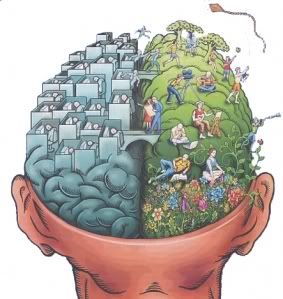
Since the beginning of man's journey, our right and left brains have been at war with each other. This struggle has been retold over and over again throughout the world's myths, but the secret tradition has a particular image. Our left hemisphere can be represented by the Greek titan, Kronos, the god of time, and the right by the feminine Mother. Saturn/Kronos, for his part, is the supreme masculine energy of order, representing numbers, math, words, and language. He and his army of giants are eternally waging war on the gods (represented by the mother in her various pieces) in the right hemisphere, sometimes winning out like in our modern age, and other times being stuck in Tartarus. In The Alphabet Versus the Goddess, Leonard Shlain proposes "that the left hemisphere is actually a new sense organ designed by evolution to perceive time" (23). Time destroys everything. It causes us to perceive our lives as destined to end. This is a terrible dilemma of the human condition, being the only proven animal to know that some day he will die. It boxes us and begins the transformation into the new consciousness of pinpointing. However, the left also gives us "the ability to conceptualize that the abstract words crime, virtue, punishment, and justice are all related is supremely human. To be able to leap from the particular and concrete to the general and abstract has allowed us to create art, logic, science, and philosophy. But this skill tore us out of the rich matrix of nature. The part torn away became the ego" (Shlain 22). These areas allow the human mind to construct thought like children playing with Legos, according to Shlain, and are always linearly constructed. This is a necessary evil. In esoteric lore, figures like Satan and Set (notice the similarity to 'Saturn') are seen as being the representation of the animal consciousness. It is clear that the snake in the garden was necessary for humans to progress to being a creature with a mind. Men, strangely enough, often force women into the Satanic role, but I would argue that this is a confusion. The left-brain pinpoints. It focuses energy, it makes plans, and is most helpful during the hunt. Men's eyes are better able to focus on a particular object and women's are more capable of seeing peripherally. Again we see the mother as holistic and Saturn as boxing.
It is also clear that the right brain harbors the Mother. Walter Ong relates that sight isolates, but sound surrounds. Language, a creation of Saturn, does as well. Shlain says, "a conversation can be understood only when one person speaks at a time. In contrast, one's right brain can listen to the sounds of a seventy-piece orchestra and hear them holistically" (22-3). This is the essence of the right brain. It is where intuition is felt, where uncontrollable emotions happen, where "states are under little volitional control and betray true feelings through fidgeting, blushing, or smirking" (19). The right "expresses being" and is authentic. These "feeling-states do not ordinarily progress in a linear fashion, but are experienced all-at-once. 'Getting' the punch line of a joke results in an explosion of laughter. An intuitive insight arrives in a flash. Newton and Einstein both reported examples of what the poet Rile called 'conflagrations of clarity.' Love at first sight, such as what Dante experienced when he encountered Beatrice, happens in an instant. Religious conversions, such as the one that overwhelmed Paul on the road to Damascus, strike like lightning" (19). The Mother controls the subconscious, the spiritual and invisible realms. She is the home of metaphors, the sublime, and the "altered state of consciousness" I discussed in my hypnosis entry. When we read a book or watch a movie, we are communing with her by putting ourselves in a self-hypnotized state, and also when we dream--"there is compelling evidence that dreaming occurs primarily in the right brain" (20), which would make sense in that time is forgotten in this realm. The right brain's "principal attributes concern being, images, holism, and music," because music can be heard all at once, but speech has to be broken down linearly. Finally, according to Shlain, the right hemisphere develops in the fetus much earlier than the left because it is by far the older of the two. It is the mother we first see when we leave the womb, it is she who teaches us the ways of the world, and if you are a man, it is she you must deny to become masculine.
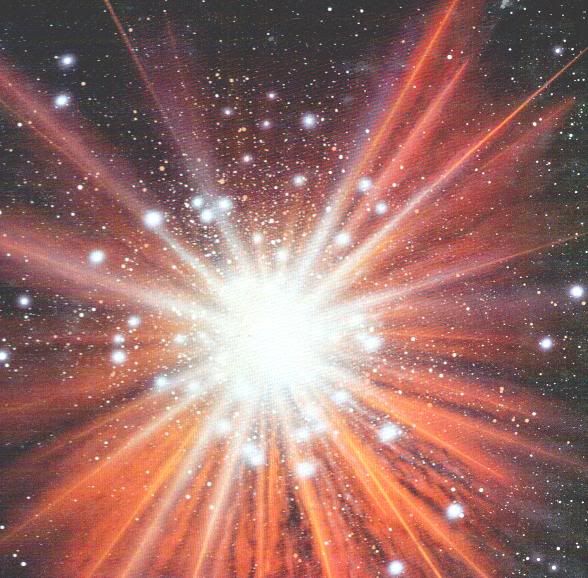
Alan Watts has the best image of the Mother in metaphor. He uses the explosion of the Big Bang to represent her, a colossal 'event', and the word 'event' is the most pertinent here. People forget that the Big Bang is not a distant thing which happened at the beginning of time, it is going on right now and we are part of it. Language is again tricky (a failure of Saturn's logos in that it can run around in circles and never arrive anywhere) and I am having a hard time explaining this. The Mother is not just the ground under our feet, which we sometimes think of as Gaea, but she is also the air in our lungs, the flesh and bones which make us up. She is the stars in the sky, and the suns burning trillions of light years away. She is the worms under the earth, the lions on the prairie, the snakes crawling along the earth, and the scorpions on the sea floor. She is not only every thing, but also every action. This is why the Big Bang is a brilliant metaphor for this--it is an event, a grand explosion spreading through space, forming suns, planets, and moons. She is the tree, treeing, the bird, birding, and the people, peopling. Imagine a person throwing a bucket of paint against a wall. It splatters and runs down the side, and all the paint, no matter how far away from the center or how intricate it becomes as it moves down the wall to the floor, is still part of the original event. Life can be seen as the increasingly complexity of the paint lines as they make their way downward. The center is chaotic but the further away you get from it the more detailed and beautiful the splash can become. Modern new age movements have shown the mother as being a peaceful old woman wearing an apron and a dress. The ancients saw her as not only loving maternal figure, for she gave birth to them, but also vicious, capable of handing out death as well as taking it away--"the earth is both womb and tomb" (Shlain 31). Events can be both violent and calm, just like emotions.
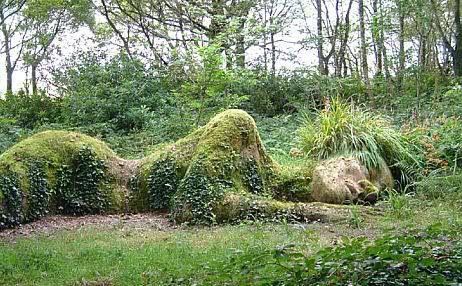
Throughout the Paleolithic period, Saturn the divider and the holistic Mother were held in balance, but as mankind moved to the Neolithic era about 10,000 years ago, the nurturing feminine energy became far more important. "The crop," according to Karen Armstrong in A Short History of Myth, "was an epiphany, a revelation of divine energy, and when farmers cultivated the land and brought forth food for their community, they felt that they had entered a sacred realm and participated in this miraculous abundance. The earth seemed to sustain all creatures--plants, animals and humans--as in a living womb" (Armstrong 42). Shlain comments that this particular form of culture was geared toward the female mind because "caring for young plants and animals were nurturing tasks that they had been performing all along in their role as mothers" (Shlain 33). Female deities began to move to the forefront as male ones fell behind, diminishing in importance as only pawns to a greater mother goddess' intentions, dying every year when she threw him away to renew herself. Agricultural was a logical task and required lotting, thus belonging to Saturn, but the Mother defeated him in importance because of the culture's emphasis on nature. Armstrong explains that "in early Neolithic mythology, the harvest was seen as the fruit of a hierogamy, a sacred marriage: the soil was female; the seeds divine semen; and rain the sexual congress of heaven and earth. It was common for men and women to engage in ritual sex when they planted their crops. Their own intercourse, itself a sacred act, would activate the creative energies of the soil, just as the farmer's spade or plough was a sacred phallus that opened the womb of the earth and made it big with seed" (Armstrong 44). Like the human woman gave birth to babies, the earth gave birth to plants, and some creation myths went as far to explain man's origins as blossoming from the ground like a crop; and instead of a shaman traveling into the caves to commerce with animals and gods, worshipers went underground to commune with the origin of life, the womb.
This female deity was known by many names across the ancient world--Astarte/Asherah in Syria, Inanna in Sumer, Istar in Babylon, Isis in Egypt, and Hera/Demeter/Aphrodite in Greece. There is even some evidence to suggest that war was not as common during this time because excavated communities had no defenses against outside invaders. However, the mother could also take away as much as she could give. Agriculture had the potential of disastrous results for a community if a bad season persisted. She could also kill a new mother during birth, a strange happening in the animal world, but which was common in humans because of our bipedal structure. Armstrong explains that the "Mother Goddess was not a gentle, consoling deity, because agriculture was not experienced as a peaceful, contemplative occupation. It was a constant battle, a desperate struggle, against sterility, drought, famine and the violent forces of nature, which were also manifestations of sacred power" (46-7). Hecate, for example, is both a goddess of death and fertility because in this age these two ideas were deeply linked (similar to the Apocryphal Lilith). In fact, the time before agriculture's invention was often perceived as a Golden Age by the ancients. It was a time before the great flood which destroyed Atlantis and was slowly cutting off mankind's access to the gods. This metaphor is portrayed in the Garden of Eden story where man and women lived in coexistence with the animals, and in the Babylonian legend of Gilgamesh, when Enkidu is tamed by a prostitute. Instead of a honorable death in the pursuit of a manly goal, men and animals were often offered as sacrifices and their blood plowed into the fields as a metaphor for the dying gods. This was not a time of warrior heroes like Hercules. Death was instead seen holistically and not something a heroic warrior set out on adventures to destroy. The myth of Persephone was prevalent in Greece with the Eleusinian mysteries and reminded initiates that death was not the end. Just like plants need to be pruned to regrow, and crops needed to die in the winter be be born again in the spring, so did the human conscious. Thus, the feminine right brain had become dominant over the masculine left.
2. Saturn, the Boxing God
"The most merciful thing in the world, I think, is the inability of the human mind to correlate all its contents. We live on a placid island of ignorance in the midst of black seas of infinity, and it was not meant that we should voyage far. The sciences, each straining in its own direction, have hitherto harmed us little; but some day the piecing together of dissociated knowledge will open up such terrifying vistas of reality, and of our frightful position therein, that we shall either go mad from the revelation or flee from the deadly light into the peace and safety of a new dark age." - H.P. Lovecraft
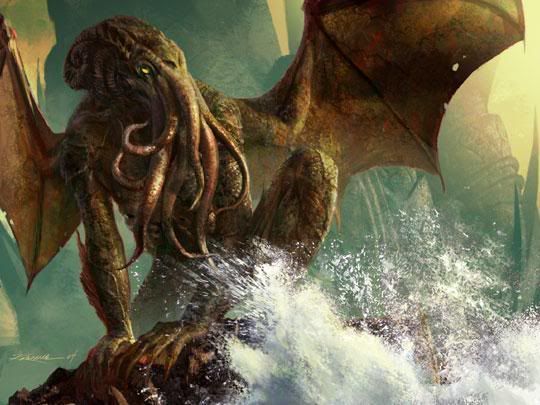
You have just purchased a new house which is in an isolated area, surrounded by trees, and with neighbors miles away. You have never lived in the country before, and you leave excited, ready for a new adventure; however, as you turn to drive up the dirt road to your home for the first time, a man hails you over. He warns you that the house is haunted and all the people who have lived there before you have committed suicide during their first night stay. You disregard him as a crackpot as you pull into the driveway, but you have to admit the house puts you off kilter--there is something odd about the way the stairs creak when you walk up them, the strange smell from a source you cannot find. As you lay in bed that night, contemplating what the man said, you turn off the light. You are surrounded by a terrifying darkness. Your heart beats faster in your chest. Maybe he wasn't lying. Maybe he wasn't just trying to scare a foreigner off. Black, that's what in your vision, black. You turn on the light and things get better. This is the force of Saturn, the cloud of darkness which wants to consume the universe. He is indifferent towards you, and that is what makes him truly terrifying.
According to secret tradition, the event which preceded the creation of the universe was God peering into a mirror. One could see this as the right and left hemispheres becoming aware of the others existence and causing consciousness to be born. Mark Booth in The Secret History of the World says that "putting yourself into God's position involves imagining that you are staring at your reflection in a mirror. You are willing the image of yourself you see there to come alive and take on its own independent life" (Booth 32). By reflecting upon himself, God started the war between Saturn and the Mother. Walter Ong discusses how in illiterate cultures, abstract words for things have no place. To reflect on the self or to ask about impractical ideas such as the concept of a 'tree' would make no sense to them. Saturn is the masculine god of language, and some theorists speculate (Shlain being one of them) that the invention the alphabet was the beginning of civilization's paranoia and ultimate misogyny towards the female. Before the advent of such things as handwriting, Booth says, the ancients, "had less of a sense of physical objects. Objects were not as sharply defined and differentiated to them as they are to us. If you look at a depiction of a tree on the walls of an ancient temple, you will see that the artist has not really looked to see how its branches are joined to the trunk. In ancient times no one really looked at a tree in the way we do" (Booth 31).
At the time Walter Ong was writing Orality and Literacy in the late '70s and early '80s, only 106 of the thousands of languages ever spoken had "been committed to writing, [...] and most have never been written at all. Of the some 3000 languages spoken that exist today only some 78 have a literature" (Ong 23). Written word is relatively rare across history and cultures, gaining the greatest dominance in the West and Near East. It is the basis of logos and rational thought, of law, math, and science. Europe, the Middle East, and North Africa were driven by this written culture, with their patriarchal God and hierarchy. Muslims, remember, refer to themselves as well as Jews and Christians as "peoples of the book," and Moses received the Ten Commandments in writing from a sky god. Jews are so greatly affiliated with their holy texts that Hebrew was instated as the national language when Israel was made a state, and across the world this holds true. People hold tightly to their languages, just ask a French person to tell you the time in English.
Language also remains the easiest way to identify a specific culture. According to World Politics Trend and Transformation, "different languages reflect different views of the world that predispose their speakers toward different ways of thought," and "provides an ethnic and cultural identity" (Kegley and Blanton 165). The language we speak affects how we think, and how we think affects how we act and the habits we form. An interesting question you can inquire from a bilingual person is what language they think in. One Saudi Arabian man said he now primarily thinks in English and had even begun to dream in the language. Several threads spread across the internet ask a similar question. Here are a few: 1, 2. The second deals specifically with what language deaf people think in--it turns out it is in gestures. A book I picked up from the library titled Psycholinguistics and Reading and written by Frank Smith, deals specifically with the psychology of reading. The linguist Noam Chomsky has pondered whether or not we were born with the ability to speak, but the book's writer, Smith, disagrees with this, saying that like a bicycle, language was invented for humans by humans.
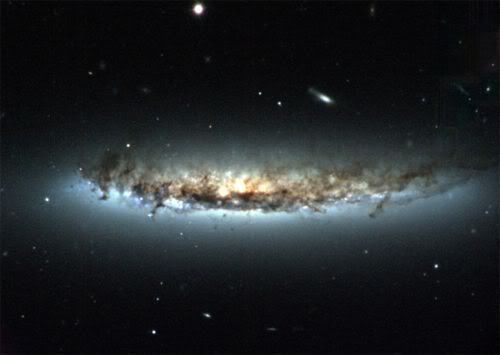
Writing and reading are abstract activities. By naming something, we gain a certain power over it. Adam began to do this before he was kicked out for bad behavior, and this need seems to be strictly human. In some cultures it was customary for a child to receive their final name when they entered into adulthood. Others hold a certain superstition about allowing just anybody to know their appellation, as the person may be hostile and curse them. In Monotheistic traditions, God's true name is hidden from his believers, and even in today's pop culture, we see superstitious wizards from the Harry Potter fictional universe unwilling to say Voldemort because of the power it holds. By naming something we give it a new abstract life--or to be oxymoronic, a dead life cut from the Mother. Where before it was as if a mist, we materialize it by calling it something, by acknowledging it is different than everything else. This is an idea from the secret tradition because the initiates believe that before the beginning of history, the universe was just that, a mist. Booth states that "this gas or mist was the Mother of All Things, carrying everything needed for the creation of life" (Booth 63). However, as the Bible states: "Darkness was upon the face of the earth." This darkness was Saturn, "a searing dry wind that almost extinguished the potential for life altogether" (Booth 63). Here I will quote the entire passage from Booth's book because he says it so much better than I can:
Saturn "would trace the limits of the solar system. In fact he was the very principle of limitation. What Saturn's intervention introduced into creation was the potential for individual objects to exist--and therefore the transition from formlessness to form. In other words, because of Saturn there is a law of identity in the universe by which something exist and is nothing else and nether is anything else it. Because of Saturn an object occupies a certain space at a certain time and not other object can occupy that space, and neither can that object be in more than one place at one time. In Egyptian mythology Saturn was Ptah who moulds the earth on a potter's wheel, and in many mythologies Saturn's title is Rex Mundi, King of the World or 'Prince of this world', because of his control of our material lives. [...] Saturn's tyranny over Mother Earth, his murderous attempt to squeeze all potential for life out of the cosmos, continued over vast periods immeasurable to the the human mind" (65).
In this story we can see the birth of the left hemisphere of the brain. Like I stated earlier, when the fetus is developing in the mother's body, the first part of the brain to form is the right. It is by far the oldest section. "The old, wise, right side," Shlain say in Alphabet, "more familiar with the needs and drives stemming from earlier stages of evolution, can be better relied upon to negotiate with them than the younger side [in the early maturation of the mind]. The right hemisphere integrates feelings, recognizes images, and appreciates music. It contributes a field-awareness to consciousness, synthesizing multiple converging determinants so that the mind can grasp the sense' input all-at-once" (Shlain 18). Before the left side forms, it is the the Mother, the right, who is in complete control of the processes of the body. It is not until 'darkness falls' that the ego begins to form.
Perhaps the most famous representation of Kronos is by Goya. Here we can see the terrible Titan feasting upon one of his children. It is a picture of madness and is the great evil of the left brain--destructive, yet necessary.
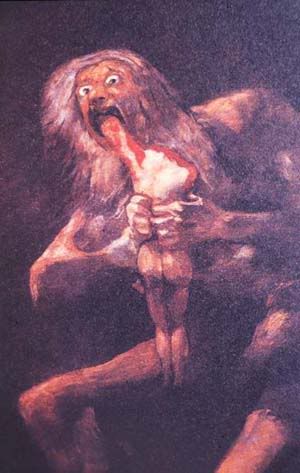
3. Delving Deeper
In another example of the power of Saturn, imagine you are walking through the woods in the evening, having a great time. You are enjoying the birds in the trees, and the chipmunks which scurry off before you arrive. There is so much to explore, so much to find and love. After an hour's worth of fun, you decide to return to your car, but you soon realize you can't find the trail. Beads of sweat start to form on your forehead. You begin to run. The night is quickly approaching, and when it arrives, you scream. This agent of darkness, of terror, of chaos, was written about in Genesis--Saturn, the great darkness swirling in space, eating up planets, solar systems, and galaxies. He is the black hole which rips matter to shreds, tear holes in the fabric of time and space itself. Some day, when we are in great ships traveling through star systems, we will come across him in all his horror. Hellish orbs will swirl around them like an eddy, caught in the Sarlac's pit, dragging down his prey. Saturn wants to destroy everything, because it is there--and the way he does this is by making everything the same. In "A Wrinkle in Time" he is IT. IT's form of evil isn't great explosions or massacres, it is stealing the soul from a person, making them like ants in a colony. They have no lights in their eyes. They do everything at the same time, creepily bouncing balls in their drive ways. In the end, this is Saturn's goal--it is to steal our spirit from us, make the universe into something like complete matter. This is the great danger of a society possessed by the spirit of him, stealing away human's individual rights to life, liberty, and property. Saturn makes men into meat, into senseless material with no rhyme or purpose. He is a god of this world, living amongst us, cutting up pieces of the great blanket and making a quilt.
Saturn is the spirit of duality, language, and logos, but at the same time opposed to all these things. He attacked the great mother earth. He wanted to shred her to pieces, but she was saved by the light of the sun. Booth describes the chaotic God who is found across ancient myth--Satan, Seth, Loki. "If an individual entity can exist through time, then by implication it can cease to exist too. This is why Saturn is the god of destruction. Saturn eats his own children. He is sometimes portrayed as Old Father Time and sometimes as Death himself. Because of Saturn's influence everything that lives contains the seeds of its own end, and it is because of Saturn that what feeds us also destroys" (Booth 65). Saturn introduced to the world dualities and conflicts and death--this will later be exacerbated by Lucifer, the light bearer, but this was before higher states of consciousness, before the fall. "Death is in everything in the cosmos," Booth writes, "woven into the bright blue sky, a blade of grass, the pulse of a baby's fontanelle, the light in a lover's eye. Because of Saturn our lives are hard. Because of Saturn every sword is double-edged and every crown a crown of thorns. If we sometimes feel our lives almost too hard to bear, if we bruise and if we do cry out to the stars in despair, it is because Saturn pushes us to our limits" (65).
Saturn and the other Titans are often pictured as giants in our mythos. Giants are the metaphorical need to destroy what's beautiful and rend it into simple matter—they are agents of chaos and destruction. Kronos, the Greek appellation of Saturn, was the father of Zeus, Poseidon, Hades, Hera, Hestia, and Demeter, and his name means Time. Kronos tells the heavens and the ground beneath him (his parents) that he is their ruler. They reply vociferously back, “[Your children] will bind you in a terrible prison, and one of them will rule instead of you!” (Green 10). Kronos knew the Earth could tell no lies, so every time his wife gave birth, he would eat the baby—“just as Time swallows up the years, one after another” (Green 10)—until one day his wife could take no more. She stole Zeus away and hid him in the mountains of Crete, instead giving the terrible Titan “a stone wrapped in baby-clothes” to eat. After he is grown, Zeus, with the help of the Cyclopes, defeats the Titans and throws them down to Tartarus. There they rest until they rise again and wage war upon the Olympians in a terrible battle reminiscent of Ragnorak and the Genesis story of Nimrod. The fear of the giant is also the fear of ourselves. He is both outside and inside us—a force that wishes to reunite with the surrounding world in “Otherness”, a lost paradise to which we can never return. The giant’s cannibalistic tendencies speak to his need to assimilate, retake what is his—an ordered and structured matter returning to chaos. He wants to see the sun go out in Ragnorak between Fenrir’s jaws. He wants to demolish Asgard and kill everything that is beautiful. He wants to make war on Heaven and Earth and consume it all with his terrible jaws. Kronos eats his children. This represents his need to render the representations of the cosmos into mere shit, material. Saturn is the will to dominate. He destroys things by controlling them, just like we destroy nature or relationship by trying to wield too much power over it.
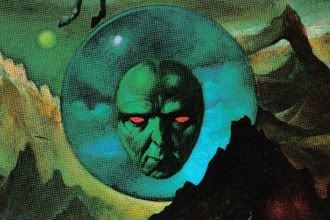
He is represented by cultural and literary figures--Emperor Palpatine, IT, Lord Voldemort, Cthulhu, The White Queen--time after time, story after story. How can this be that a black force, that a solidifying agent, can create so much chaos but at the same time represent sterile, dead, transformation into geometry and block? The great swirling darkness is trying to destroy Mother Earth, the wholeness, and create another--one of dead space, of static separations, a universe of boring eternity. When we think of Saturn, we should think of Deleuze and Gattari's "Smooth Space." Modern man has divided the world into countries, states, counties, kingdoms, species, genuses, departments--everything is its own special place. Borders are a thing of Patriarchal civilization. Where mother earth is the feminine force of nature, Saturn is the masculine one. In Shakespeare's plays, characters run to the wood, a place without fences to conduct love affairs. In the forest, gender breaks down, animals and humans begin to mesh together. It is a place of magic and mystery. Theseus' Thebes, Augustus' Rome--these places are ruled by men. Civilization is man's sphere of influence. Civilization is a place of increasingly striated space. By hacking at the wholeness, we create the perfect material universe, ruled by Saturn, the child eater, the boar who killed Adonis. Picture a square--it has a line drawn through the middle, making two objects--then another, then another, then another, until the box has so many lines that it's just a square again. Mother Earth is a square, Saturn is a square, and we are caught in between--two great dualistic wholes--material and spiritual. It is only through the image of the rising and setting sun, of the seasons, do we see that both these conditions imply each other.
Death implies life. Life implies death. Our imperfections are what make us lovable. It is exactly because we have flaws that draws us to other forms of imperfect consciousness, and so many people have trouble relating to an omnipresent, omnipotent, perfect God. "Aren't children lovable because they're falling down all the time and have little bodies with the heads too big?" Joseph Campbell says in The Power of Myth. "Didn't Walt Disney know all about this when he did the seven dwarfs? And these funny little dogs that people have--they're lovable because they're so imperfect" (4). Bill Moyers asks Campbell if perfection would be a bore. "It would have to be," he replies. "It would be inhuman" (4). The history of Mother Earth/Saturn/Apollo is the history of consciousness. We can see how throughout the ages the wholeness of nature and life is always at tension with the chaos of material hell. Perhaps this war's greatest theater was the West. Here is where man worshiped God as the great governor of the universe, and it was this line of thinking which made it easiest for Satan/Saturn to wage his greatest battles. If this great force was left to rule the universe, he would conquer the cosmos. What's preventing him from doing this?
No comments:
Post a Comment